happy New Year everyone.
The happy Chinese New Year is over halfway, and today is the first trading day of the Year of the Rabbit.
The continuous rise since the beginning of the year is causing more and more anxiety: Investors whose positions are not yet full will be entangled in whether to “chase the rise” in the near future; investors who have experienced more than a year of market tossing and waiting for their return , I will be entangled in whether to reduce my position, fearing that it will fall back again.
Before answering this question, let’s review the performance of the global market during the Spring Festival.
one,
Nasdaq in the United States rose the most by 4.32%, France by 1.45%, Germany by 0.77%, and the UK by 0.07%. In the Asia-Pacific market, Japan 3.12%, Vietnam 1.33%, and India fell 2.66%. Hong Kong stocks rose 2.92% in the two trading days on Thursday and Friday, and the Hang Seng Technology Index rose 5.35%. Since the beginning of this year, the Hang Seng Index has risen by nearly 15%, the best performance in the past 20 years.
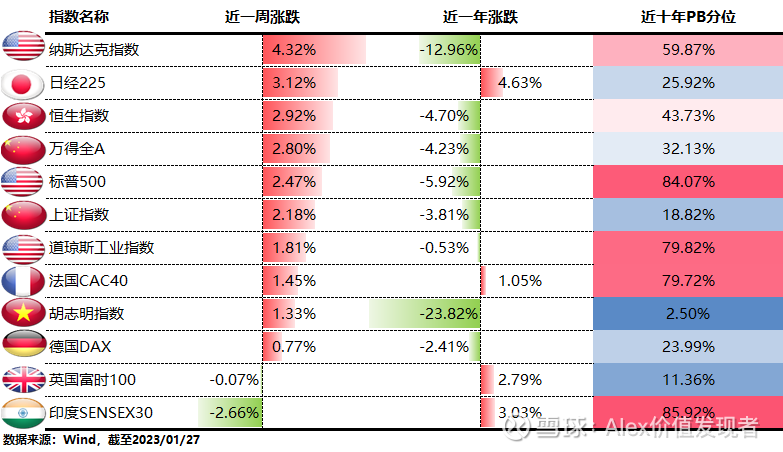
The A50 index, which is the vane of the A-share market, attracts much attention every holiday. In the past 10 years, the biggest increase in A50 stock index futures in January occurred in 2019, when it rose by 11.2%, and thus started a two-year bull market. During the Spring Festival, the A50 stock index futures rose 1.56%. Since January, it has risen by 10.5%. In the last two trading days of January, it is expected to challenge the increase in January 2019.
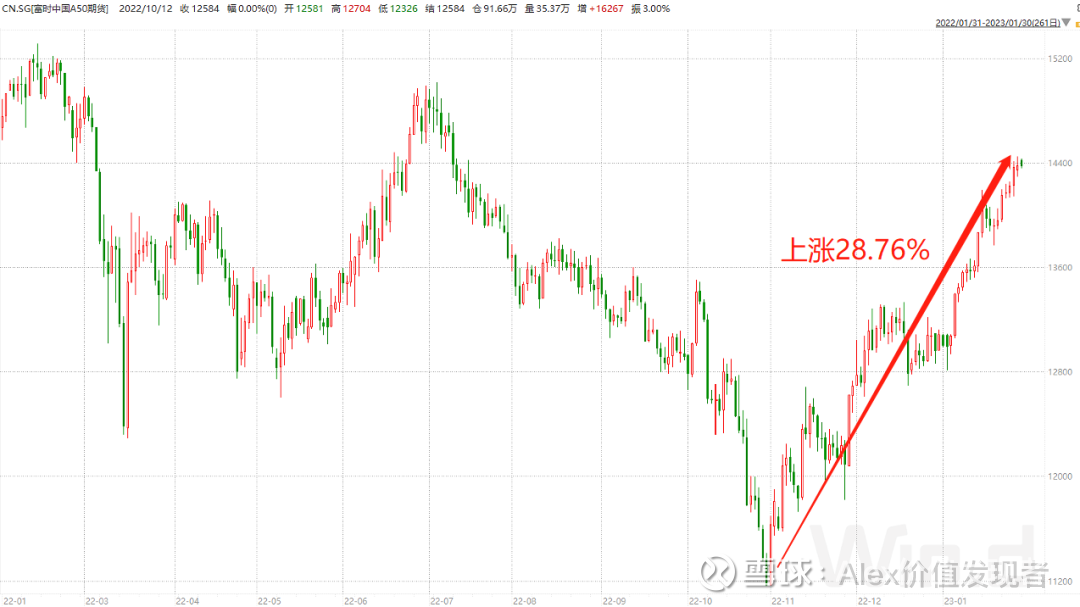
In terms of A-shares, before the holiday, the Shanghai Composite Index rose by 2.18%, Wind A rose by 2.80%, the GEM Index rose by 3.72%, and the Shanghai and Shenzhen 300 Index rose by 2.63%. The highest single-month record since its opening has exceeded the net inflow of the whole year of last year.
Whether it is the A-share and Hong Kong stock indexes that lead the world, or the enthusiastic pursuit of northbound funds, it all shows one point: global capital is optimistic about the future performance of Chinese assets.
However, we ourselves are worried about A shares. There are three common reasons: one is that we believe that they have risen so much recently and there is a risk of a correction; the other is that the economic fundamentals are not good, and recovery may take a long time; The black swan event caused the market to fall.
two,
Faced with such market differences, I choose to stand on the side of global capital.
Because the logic of these concerns is not smooth:
First, investment should not fall into an overly naive price analysis. The reason why we feel high is mainly because we are comparing with the lowest point of the market. For example, the index “China Internet” in the overseas market has risen from the lowest point of 2711 points at the end of October last year to the current 4937 points, an increase of 82%, which is quite a huge increase.
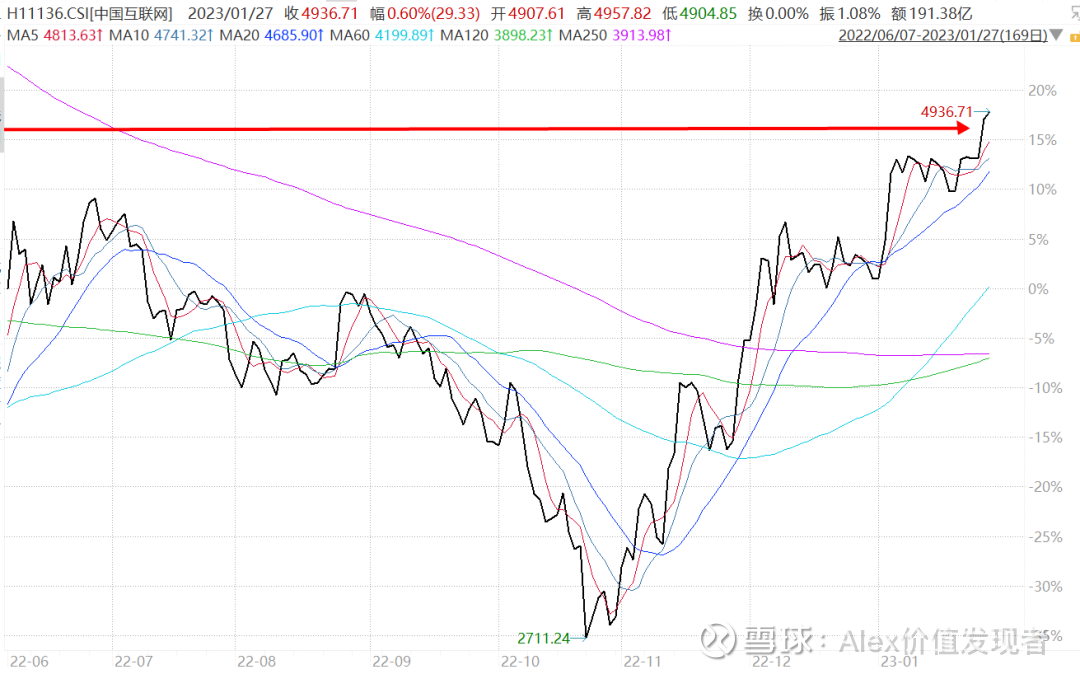
However, is it really high after an increase of 82%? Look at another picture:
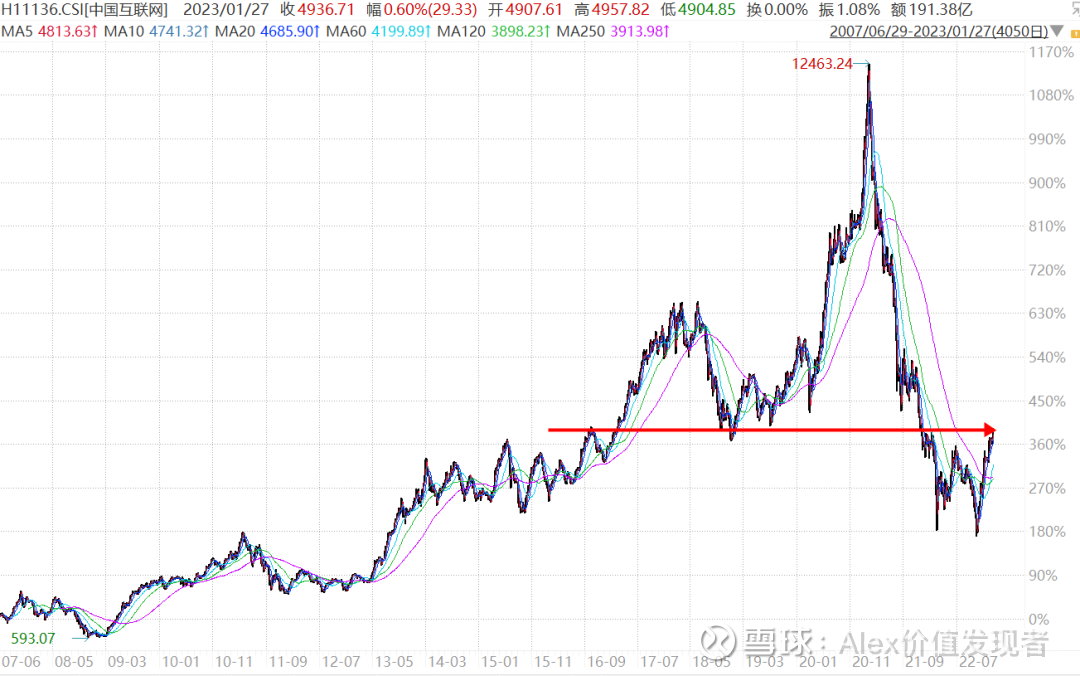
As can be seen from the above chart, the index is still at a low level since the end of 2016, and the decline from the highest point is still as high as 61%. If it can rise back to the highest point, the space will be as high as 152%.
So, if it is higher than the lowest point or lower than the highest point, which one is right?
In fact, this method of comparing sizes is not suitable, and it is too simple. The price in stock assets is essentially a valuation, that is, look at the price-earnings ratio, price-to-book ratio, etc. Therefore, whether it is analyzing overseas Chinese stocks, or the high or low of Hong Kong stocks and A-shares, one should look at the historical percentile of the valuation level. At present, the price-earnings ratio of China Internet Index in the past 10 years is 58% percentile, and the price-to-book ratio is 12% percentile. Considering that in recent years, both the world, China and the Internet industry have faced many major adverse factors and huge fluctuations in earnings, the price-to-book ratio is more meaningful. Therefore, overall, the current valuation level of China’s Internet is not expensive compared with the past. However, the current Hang Seng Index has a P/E ratio of 43% and a P/B ratio of 21%, which are reasonably low; Wind All A Index has a P/E ratio of 30% and a P/B ratio of 16%. Therefore, the current A-shares, Hong Kong stocks, and China stocks are all reasonably low, not high.
Second, the fundamentals of the economy are not good, and recovery will take a long time, so it is difficult for the stock market to rise. We can refute this with an example: From the beginning of November to the end of December in 2022, many Hong Kong real estate stocks have doubled, but in these two months, neither the real estate industry nor the fundamentals of these companies have basically failed. improve. But why the surge? Because expectations have changed: Under the stimulus of multiple rescue policies, market expectations have changed, although the fundamentals have not changed in the short term. Therefore, the focus of investment is always the future, not the present . If you see that sales have started and the fundamentals have really improved significantly, the stock price may turn around and go down. Many bull markets have occurred against a backdrop of poor economic fundamentals. If you invest based on the actual changes in the fundamentals, you will have nothing left to lose. What matters is where it’s expected to go, not what’s in front of it. In the context of the liberalization of the epidemic policy, it is basically a consensus that China’s economy will gradually return to a reasonable growth channel. This is why northbound funds are inflowing wildly.
Third, the black swan may come at any time. This is a common concern of many investors with certain experience, because they have experienced many black swan shocks in the past few years, and they are well aware of the pain of black swans. However, the reason why the black swan is called a black swan is because it cannot be predicted in advance and cannot be prevented. And in the long run, the black swan cannot stop economic growth and the stock market hits new highs, so it is only a periodic influencing factor, not a long-term determinant, so don’t pay too much attention to it. If you set aside a large number of positions to guard against black swans, in the end you can only guard against both risks and opportunities.
In addition, the necessity of preventing black swans should actually be considered comprehensively in combination with the market valuation level. Because when the valuation is at a low level, even if there is another black swan, the impact will be relatively limited, or even if it is affected, the time and space required for repair will not be too large, but if the valuation is at a high level, any black swan will It may lead to a trend reversal in the market, causing the market to fall sharply. When the current market valuation is relatively low, the focus should be on grasping its long-term investment value, while preventing black swans is secondary.
three,
We are full of expectations for 2023. If there are no major surprises, this will be a year worth grasping. According to some perspectives from the perspective of the future and the present, it may be the best year in the next five years .
Why not look forward to the fact that the market temperature may reach 60°?
Investment should return to the core framework, rather than relying on one’s own feelings and past experience to infer the future, and it is not the common way we mentioned above to judge the future based on price size, rise and fall. Even valuation is only a part of the complete logic of research and judgment.
The core framework of investment: fundamentals, valuation, policy, trend, market sentiment (risk preference).
Fundamentals : Tend to improve;
Valuation : low level;
Policy : Continue to make active efforts to promote the improvement of fundamentals;
Trend : From last year’s left, downhill, to the right, uphill stage;
Market sentiment: It has emerged from the pessimism and despair of last year, and has begun to become more optimistic. A similar angle to market sentiment is market risk appetite: when market risk appetite declines, investors will sell equity assets and highly elastic assets, such as the Internet, technology, etc.; when market risk appetite rises, investors will pursue highly elastic, growth assets. Sexual assets, such as the Internet, medicine, technology, etc. Under the favorable effects of multiple factors such as fundamentals, valuations, and policies, market sentiment has gradually increased. Once emotions are on the rise, high temperatures may come.
In summary, we are full of hope for 2023.
The current valuation thermometer is 29.92°, which is still “underestimated” . The fear and greed index is 95, and the index attribute is “extreme greed” .
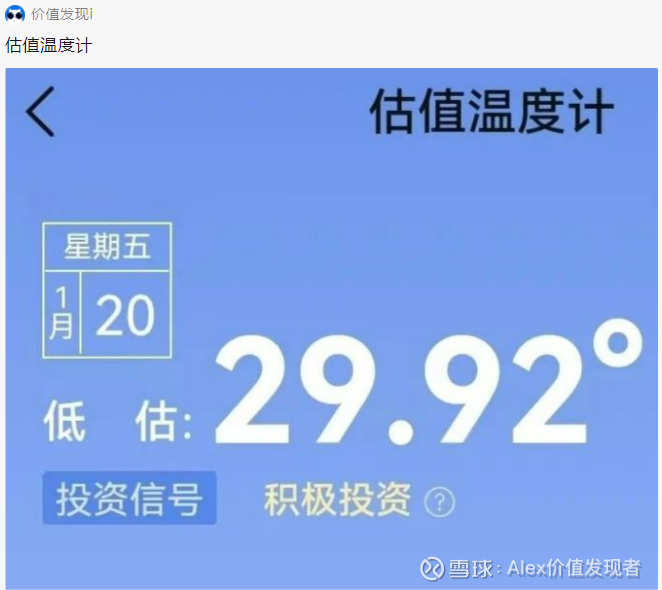
Special Note:
This article is for information sharing only and does not constitute any investment advice. Market risk, the investment need to be cautious.
#财洲Freedom# @今日话话@雪球fund $Global selection (TIAA003004)$ $Anyingbao(TIAA003002)$ $Active progress(TIAA003005)$ #上证指数# #实业#
This topic has 1 discussion in Xueqiu, click to view.
Snowball is an investor social network where smart investors are all here.
Click to download Xueqiu mobile client http://xueqiu.com/xz ]]>
This article is transferred from: http://xueqiu.com/1833906890/240785657
This site is only for collection, and the copyright belongs to the original author.